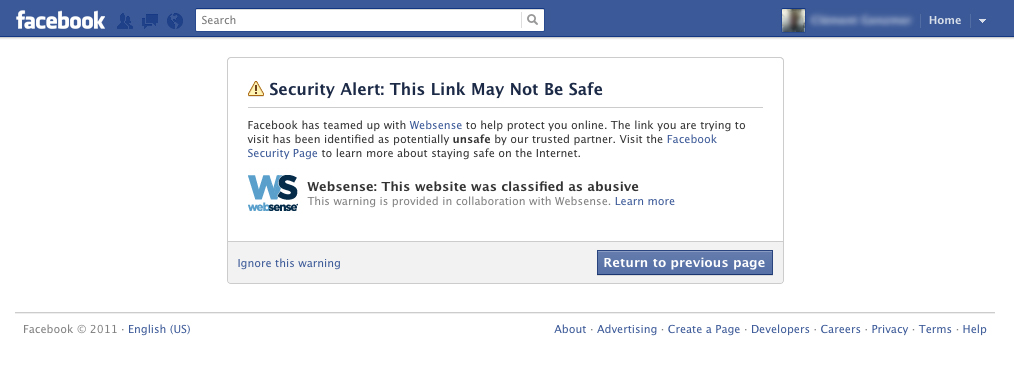Facebook is announcing a partnership with security firm Websense today, in order to protect its users from dangerous links that lead to malicious websites and malware sites. Going forward, when a Facebook user clicks on a link, the new system will first check the link against Websense’s system to determine whether or not it’s safe.
If it’s not, a message is displayed warning the user that the link is potentially harmful and suggests you return to the previous page.
The “return to previous page” button is positioned to the bottom-right of the message, and is very prominent, subtly encouraging the user to choose that option. However, for those who choose to take on the risk, a smaller “ignore this warning” option is available on the left.
Also included in the message is information about why the link was flagged as suspicious.
The system being used is powered by Websense’s “ThreatSeeker Cloud,” the security firm’s classification and malware identification platform. The company says it’s capable of analyzing threats in real-time using its own proprietary technology known as the “Advanced Classification Engine,” or ACE. With ACE, Websense can not only block known malware sites, but also those which the system has never encountered before. It can even block shortened URL’s, like those truncated using bit.ly, a company Websense partnered with in November 2009.
This isn’t the only security mechanism Facebook has in place to protect against malicious links, it should be noted. In May, the social networking site partnered with the crowdsourced reputation management service Web of Trust to offer similar protections. Web of Trust, which will continue to operate on Facebook, also checks to see if links are classified as spam, malware or phishing and presents a warning message of its own. Web of Trust, however, relies on submissions from a community of users who have installed its Web browser extension, not the real-time technology being used in Websense’s solution.
Facebook, too, has its own proprietary database of malicious URLs and other means it uses to keep malicious activities off its site, the company says.
This is not Websense’s first foray into Facebook protections. The company also offers a Facebook app called Defensio which allows Facebook Page owners to control the sorts of links that are posted to their wall. Defensio not only protects against malicious content, but can be configured to prevent a wide range of URL categories including sex, gambling, drugs, hate speech, violence and more.
Facebook will begin rolling out the increased protections to its 800 million users starting today.

